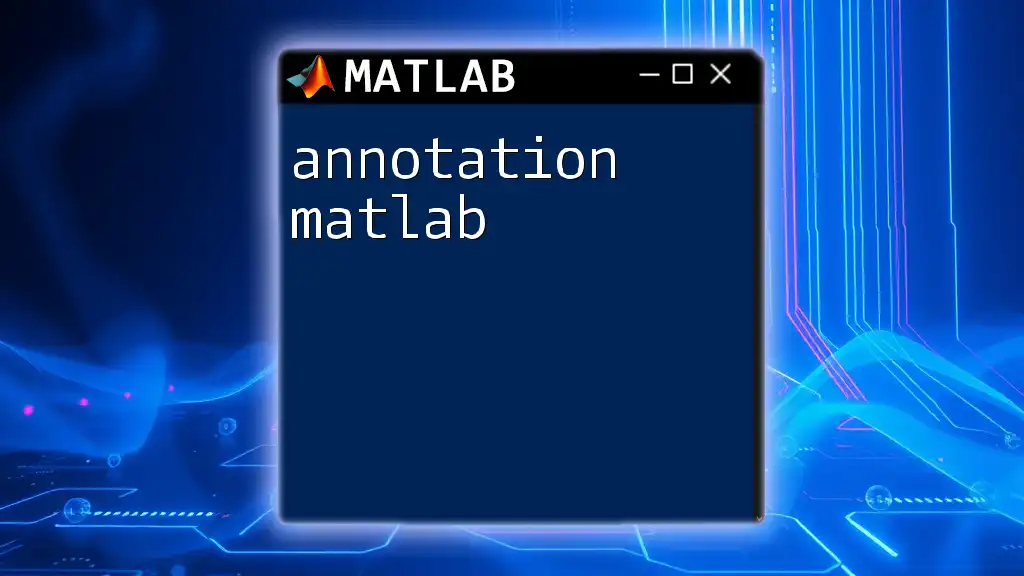The "or" statement in MATLAB is a logical operator that returns true if at least one of the conditions being evaluated is true.
Here's a simple example of how to use the "or" statement in MATLAB:
x = 5;
y = 10;
result = (x > 3) || (y < 5); % result will be true since x > 3 is true
Understanding Logical Operators in MATLAB
What are Logical Operators?
Logical operators are fundamental components in programming that allow for conditional decision-making in your code. In MATLAB, there are several types of logical operators, including AND (`&&`), OR (`||` and `|`), and NOT (`~`). Each operator serves a specific purpose:
- AND (`&&`, `&`): Returns true only if both conditions are true.
- OR (`||`, `|`): Returns true if at least one condition is true.
- NOT (`~`): Reverses the truth value of a condition.
Importance of Logical Operators
Logical operators are essential for flow control in programming. They enable conditional statements that help determine how your code executes based on dynamic data inputs. Applications of logical operators in MATLAB include filtering data, validating inputs, and modifying control flow during runtime.

The "Or" Statement in MATLAB
Definition of the "Or" Statement
The "or" logical operator in MATLAB can be represented in two forms: short-circuit OR (`||`) and element-wise OR (`|`).
- Short-circuit OR (`||`): Evaluates conditions sequentially and stops evaluating as soon as a true condition is encountered. It's primarily used in logical expressions.
- Element-wise OR (`|`): Evaluates each corresponding element of two arrays or logical expressions and returns true for each position where at least one operand is true. It is particularly helpful when working with arrays and matrices.
Syntax of the "Or" Statement
The general syntax for using either operator is straightforward:
-
For short-circuit OR:
condition1 || condition2 -
For element-wise OR:
array1 | array2
These expressions can be nested and combined with other logical operators for more complex evaluations.

Using the "Or" Statement in Practice
Basic Examples
Example 1: Simple Conditions
Here’s a simple illustration showing how the "or" statement can be applied in decision-making:
a = 5;
b = 10;
if a > 0 || b > 5
disp('At least one condition is true');
end
In this example, both conditions `a > 0` and `b > 5` evaluate to true. Thus, the message will be displayed, highlighting how the "or" statement effectively allows for flexibility in logical checks.
Example 2: Element-wise Logical Operations
Another common use is performing element-wise operations on logical arrays:
x = [1, 0, 1];
y = [0, 1, 0];
result = x | y;
disp(result);
The output here will be `[1, 1, 1]`, demonstrating that the element-wise OR operation returns true (or 1) where at least one corresponding element of `x` or `y` is true.
Complex Conditions
Example 3: Multiple Conditions
Logical operators can also chain multiple conditions for more significant implications.
age = 20;
hasPermit = false;
if age >= 18 || hasPermit
disp('You can drive!');
else
disp('You cannot drive.');
end
In this case, since `age` is greater than or equal to 18, the message "You can drive!" will display. This example illustrates how combining conditions with "or" can affect outcomes based on diverse criteria.
Using "Or" with Vectors and Arrays
Example 4: Filtering Data
One of the most useful applications of the "or" statement is filtering datasets based on certain criteria.
A = [1, 2, 3, 4, 5];
result = A(A < 3 | A > 4);
disp(result);
Here, the statement `A < 3 | A > 4` will return the values `[1, 2, 5]`, as these are the elements meeting the condition of being either less than 3 or greater than 4. This showcases how the "or" statement can be instrumental in data handling and analysis.

Common Pitfalls with the "Or" Statement
Short-Circuit Behavior
One common issue programmers encounter is the short-circuit behavior of the `||` operator. If the first condition evaluates to true, MATLAB doesn’t check the second one. This can lead to unexpected results, especially if the second condition includes function calls or calculations.
For example:
a = 5;
if (a > 0 || someFunction())
Here, if `a > 0` returns true, `someFunction()` will never execute, potentially skipping over important calculations or checks. Understanding this behavior is crucial in avoiding logic errors.
Mixing Data Types
When using logical operators, mixing different data types can lead to confusion and errors. The `||` operator expects logical expressions, while `|` can work on arrays directly.
Using them interchangeably without proper attention may yield unexpected results. For instance:
result = 5 || 10; % This will trigger an error
Instead, you should ensure both operands are logically evaluated or use the element-wise operator appropriately.

Best Practices When Using the "Or" Statement
Readability and Clarity
When employing complex logical expressions, always prioritize readability. Consider breaking down intricate conditions into smaller, manageable parts. This not only enhances code clarity but also eases debugging. For example, rather than writing:
if (a > b || c < d && e == f)
You could simplify by splitting the logic:
condition1 = a > b;
condition2 = c < d && e == f;
if condition1 || condition2
This approach makes it much easier for you or others to follow your logic.
Debugging Tips
When encountering issues related to logical statements, employ MATLAB's powerful debugging tools. Using breakpoints and the `disp()` function can help track how each condition evaluates in your logic. This practice is invaluable when debugging complex scenarios involving the "or" statement.

Conclusion
In summary, the "or statement MATLAB" is an essential tool that empowers users to conduct dynamic evaluations and control flow in their programs. By mastering how and when to use the various forms of the "or" operator, along with understanding common pitfalls and best practices, you set a solid foundation for effective MATLAB programming.

Further Reading and Resources
For those looking to deepen their understanding further, consider exploring the [MATLAB documentation](https://www.mathworks.com/help/matlab/ref/logical.html) for logical operators. Additionally, many programming guides and textbooks can provide more comprehensive insights into logical expressions in MATLAB.

Call to Action
If you're eager to improve your MATLAB skills and learn more about executing effective commands, we invite you to join our company’s courses. Sign up today for exclusive access and enjoy a special discount on your first session!

















